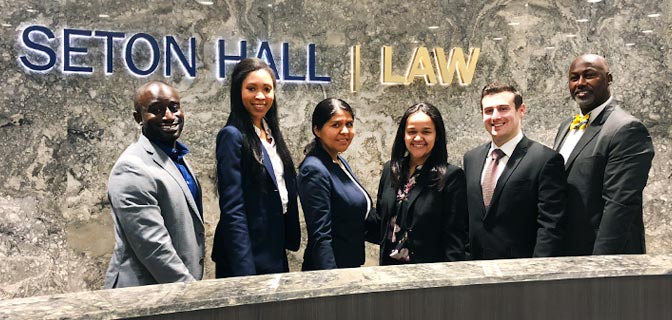Mock Trial Program
Membership on the Mock Trial Board
Who is the Mock Trial Board
The Mock Trial Board (MTB) is a group of Seton Hall law students who are interested in improving their trial advocacy skills and in competing in interscholastic mock trial competitions. There are currently 23 members of the MTB and the Board has two student co-chairs.
Mock Trial Competition
Each semester the MTB selects two or three competitions in which to compete. In order to select a competition, the co-chairs of the MTB and the Director compile a list of possible tournaments and then thoroughly research each option. The MTB has competed in competitions such as the American Bar Association Labor and Employment Law Trial Advocacy Competition, Texas Young Lawyer’s Association National Trial Competition.
During each competition, students present both sides of a case. For competitions with four students, two students represent the defense and two represent the plaintiff (or serve as a prosecutor). A typical trial lasts approximately three hours. Rounds vary by competition.
The presiding judge and jurors are licensed attorneys and sitting judges. Most are either local attorneys or specialists in the field, depending on the competition. In the case where witnesses are provided by the tournament organizers, witnesses can be anyone including college students, lawyers, judges, or other law students.
Preparing for Competitions
Here is an overview of how team practices are spent:
-
Crafting theories, themes, and labels for a case
-
Practicing each portion of the trial repeatedly (i.e. opening, direct, cross, closing)
-
Brainstorming evidentiary issues and role playing evidentiary objections
-
Arguing motions and running through the entire trial
Each team of students spend significant time practicing for mock trial competitions. Scheduled practices may occur during the week, on weeknights, or even weekends as the date of competition approaches. Practices are flexible, but required, and a strong commitment to the team is a must. Students can expect to spend significant time working on themes and theories of the case, practicing for competitions, and actually competing.
Pre/Co-Requisites
Evidence and Persuasion and Advocacy are pre-requisites for participating in mock trial competitions. All students on the MTB are required to take Persuasion and Advocacy and Evidence before competing, but students may tryout for the MTB without taking the pre-requisites.

Mock Trial Board Membership Policies
-
A student may not be a member of both the Mock Trial Team and the Interscholastic Moot Court Board. In addition, a student is not permitted to resign from one team to join the other.
-
Students must be in good academic standing to compete in a national mock trial or national moot court competition. Any student not in good academic standing must contact the Director of Experiential Learning to request a waiver. All waivers must be approved by an Associate Dean.
-
Students must have completed the required prerequisite courses to compete in a national competition (P&A and Evidence for Mock Trial; Appellate Advocacy for Moot Court). Any student who has not completed the prerequisite courses must contact the Director of Experiential Learning to request a waiver. All waivers must be approved by an Associate Dean.
-
A member of either the Mock Trial Team or the Interscholastic Moot Court Board may participate in the Interscholastic Eugene Gressman Appellate Moot Court Competition. A student may not, however, compete in either a national mock trial or national moot court competition and the Eugene Gressman Appellate Moot Court Competition during the same semester. Any student who wishes to compete in either a national mock trial or national moot court competition and the Eugene Gressman Appellate Moot Court Competition during the same semester must contact the Director of Experiential Learning to request a waiver. All waivers must be approved by an Associate Dean.
-
A student may not compete in more than one national mock trial or national moot court competition during the same semester.
Selecting the Mock Trial Board
New Board members are selected in the fall through a selection competition. The Board will distribute a fact pattern, a copy of Thomas Mauet’s chapter on Opening Arguments from Trials: Strategy, Skills, and the New Powers of Persuasion, and some basic instructions. Students will prepare opening arguments for both sides of the case. All 2L, 3L, and 4L day/evening/weekend students are welcome to try out. On the day of the selection competition, students are given at least 24 hour notice as to which side they will represent and students perform an opening argument for that side.
The next selection competition will take place in October.
Questions? Please contact us.
Danielle Craft
Co-Director
Email [email protected]
K. Anthony Thomas
Co-Director
Email [email protected]






